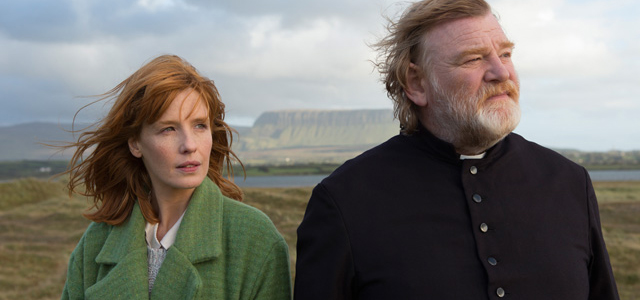(MA) Brendan Gleeson, Chris O’Dowd, Kelly Reilly, Aiden Gillen, Dylan Moran, M. Emmett Walsh
Three years after his debut film The Guard became the most successful Irish film of all time at the domestic box office and earned rave reviews around the world, director John Michael McDonagh and his star Brendan Gleeson are back with Calvary. The second part of the director’s “Glorified Suicide Trilogy,” Calvary is a very different, but every part as brilliant, film. More serious and thought provoking, it none the less demonstrates the same wicked humour, gift for dialogue and strong sense of place that made The Guard a success.
Father James Lavelle, a good man, serves as the priest of a small County Sligo parish on the west coast of Ireland. One day, while hearing confession, one of his parishioners confides that he was sexually assaulted by a priest for a number of years in his childhood. With the priest in question having long since died, the victim has decided that he will gain retribution by killing Father James. The Father is to become the victim precisely because he is innocent. “There’s no point killing a bad priest. But killing a good one? That’d be a shock.” The unidentified man gives Father James a week to get his house in order, and they are to meet the following Sunday on the beach.
From the moment that Father James receives his threat, in the very first scene of the film, he knows who it is that has delivered it. He is, after all, a good priest who knows the voices of his parishioners. But in a clever decision by the filmmaker, this information is kept from us. The film then, on one level, becomes a reversal of the traditional whodunit – a who-is-going-to-do-it. However, with the priest already knowing the identity, his week is not spent investigating the threat. That is our concern, not his. So while we watch those around him carefully, looking for clues as to the identity of the would-be murderer, Father James continues performing his role as one trying to provide spiritual assistance and guidance to his small, detached community.
His is not the easiest flock to tend to. The Father – played brilliantly by Gleeson – is confronted by a spiteful and confrontational community, and saddened by their complete indifference to matters of faith. One of his parishioners takes perverse pleasure from flaunting her adultery, with another of his parishioners, before him. Her husband, while possibly beating her, has no problem with the unfaithfulness. An atheist doctor goads him whenever he is called upon to visit someone dying in hospital. The local publican vents his financial frustrations on the Father as a representative of the wealthy Catholic Church. The film provides insight into the life of a priest in a society that no longer values or respects his contribution.
Recent years have seen a number of films exploring narratives surrounding the past crimes and abuses of power by the Catholic Church and attacking the institution (consider last year’s Philomena for example). Calvary takes a different approach to the issue. McDonagh’s film explores the impact of these revelations on the church’s place in the community. It does not attempt to defend the perpetrators of those crimes, or the institution that protected them, but rather invites us to consider the plight of those remaining good people whose efforts to do good works in the world are hindered by being forced to bear the burdens of an institution that has failed them.
Calvary features the same dark humour which made The Guard so brilliant, but here it is in service of a more serious story. At some point during its narrative, Calvary transitions from being a black comedy to a quite profound modern passion play. Father James becomes the symbolic innocent who must bear the sins of others, in this case the sins of the institution that he represents. The week that we count down marks his own walk to Calvary, as he endures the torment and ridicule of those around him.
While at times still very funny, Calvary ends up being a poignant and powerful film. At a time when most movies tend to opt for the simple and straight forward, it is encouraging to see a thoughtful film which has something to say. It also confirms McDonagh and Gleeson as a collaboration very much worth keeping an eye on.
Duncan McLean













